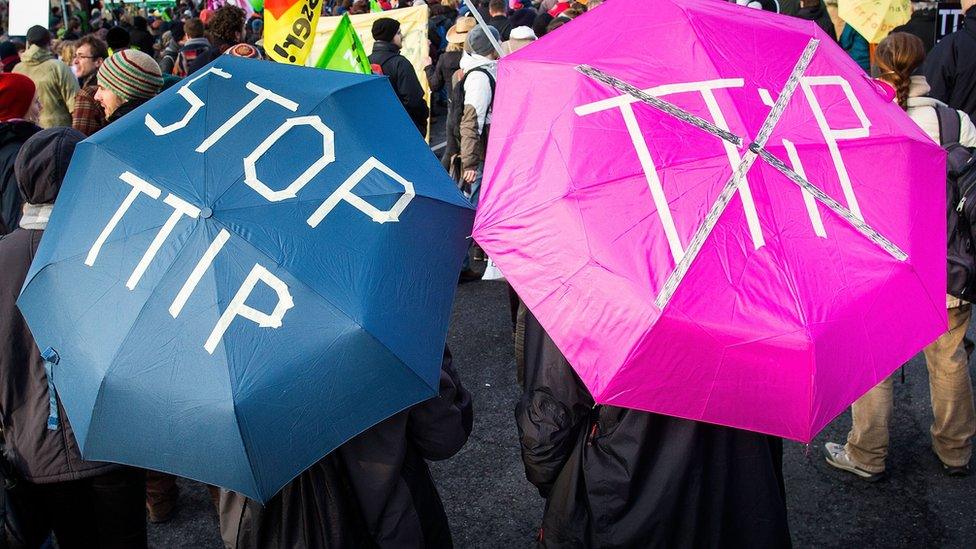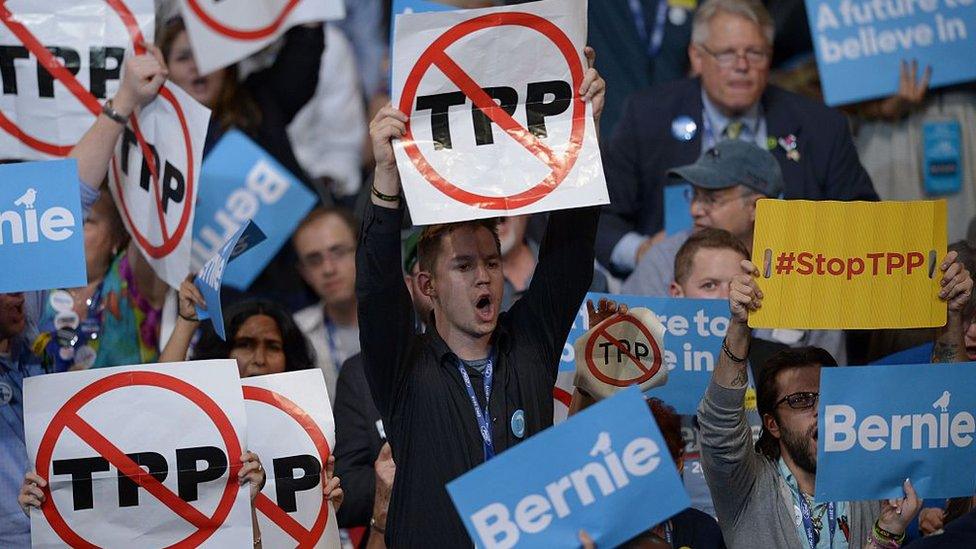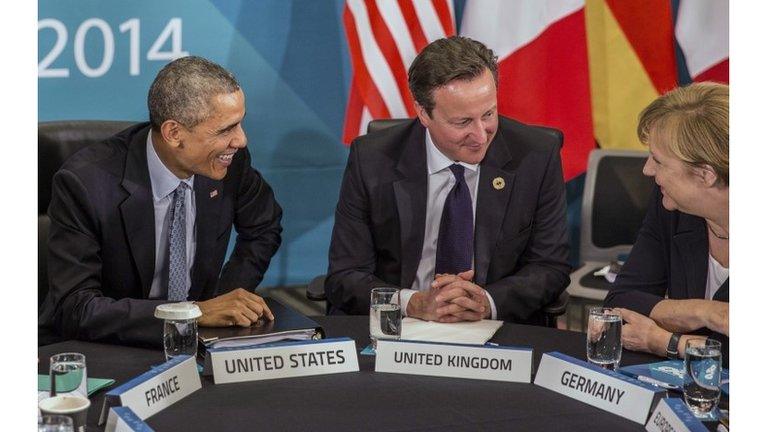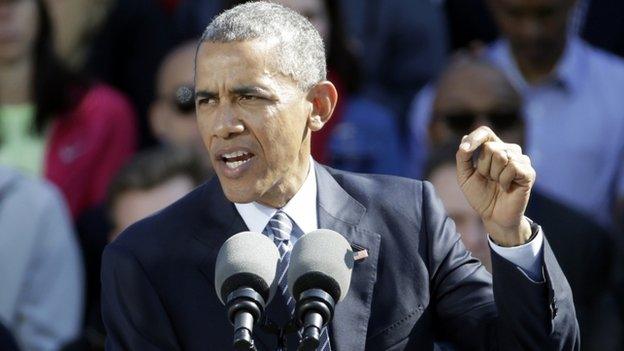What do trade agreements do?
- Published
TPP: Who are the winners and losers?
The Trans-Pacific Partnership (TPP) is the biggest trade agreement signed to date, in terms of the combined economic activity of the countries involved. But there are more deals, many already in force and others in the negotiating pipeline, including one that's even bigger than TPP.
How many are there?
Countries are required to notify the World Trade Organization (WTO) when they conclude an agreement. As of February this year, a total of 625, external have been notified (though you get smaller numbers if you count them differently.)
There are more in the pipeline, notably one involving the US and the EU, called the Trans-Atlantic Trade and Investment Partnership (TTIP). The negotiations have not been completed, but if they ever are it will be bigger than the TPP.
TTIP: What an EU-US trade deal means for your food
In addition there is a negotiation called the Trade in Services Agreement (TISA) between the EU and 22 countries. The US is involved and some emerging economies including Chile, Turkey and Pakistan.
What are these agreements intended to achieve?
To boost trade, and in the process boost economic activity, by reducing or even removing barriers to trade across international borders. Countries taking part are generally seeking improved opportunities for their businesses to sell their goods and services overseas. It is business groups who are the main supporters of these negotiations.
There are also often investment aspects to these deals which are intended to encourage more foreign investment between signatory countries.
What sort of trade barriers do they tackle?
They involve negotiating reduced tariffs, taxes that are applied only to imports. Sometimes the aim is to eliminate them on many items.
But they also try to reduce, to varying degrees, a wide range of other types of obstacle, called non-tariff barriers. For example, by:
seeking to reduce the cost to business of complying with multiple regulations
banning discrimination against foreign firms or limits on how much business they can do
at least partly opening up government purchasing to bids by foreign business
requiring countries to have at least a specified level of protection for intellectual property - patents and copyright
Some agreements also cover labour rights, for example requiring signatory countries to allow workers to organise and join unions and outlawing child and forced labour.

Some trade agreements seek to ban child labour
What about investment?
Many agreements have rules on how countries treat investors from other nations involved in the agreement. For instance:
the host country may be required to treat the foreign investor as they would a local investor
there may be a ban on imposing requirements to buy inputs locally
the investor may be given the right to choose the nationality of top management
There are often restrictions on host governments "expropriating" an investment. Conventionally that means taking government ownership without compensation. But it can sometimes be interpreted quite widely, to include "indirect expropriation", which covers actions that reduce the value of a foreign investment. The tobacco company Philip Morris tried to argue that Australia's plain packaging laws were expropriating its investment, though it ultimately lost the case.
The investment aspect often also includes a provision for arbitration, known as investor-state dispute settlement (ISDS). In some cases these have led to governments having to pay compensation to a foreign investor over a change of government policy. The Philip Morris case against Australia was one of the most controversial to have made use of ISDS.
What are the benefits of international trade?
The great majority of economists see international trade as beneficial - to all the countries that take part, importer as well as exporter. Consumers, as well as firms that buy raw materials, components and services, get more choice and lower prices. Note, however, that the mainstream economic view is not that all individuals and all firms necessarily benefit from trade.

Cars bought in the UK may well have been manufactured somewhere else
Trade helps countries to specialise and do more of what they are best at. Economists call it comparative advantage. In practice a lot of trade is within an industry - "intra-industry trade". For example, some British motorists buy French-made cars while some in France buy vehicles made in Britain. But trade enables these companies to reduce costs by servicing a larger market and allows consumers more choice. The economist Paul Krugman won his Nobel Prize partly for his work on intra-industry trade, external.
If freer trade is so good why not remove barriers on a global scale instead of in small groups of countries?
There is a forum for doing this, the World Trade Organization. It has more than 160 member countries., external The WTO began a new "round" of trade negotiations in 2001 in Doha, the capital of Qatar. But it has produced only modest results - an agreement on improving customs procedures., external
The latest WTO ministerial conference in Nairobi, in December 2015, is now widely seen as the moment when the member countries effectively gave up on the Doha Round, external.
The appeal of bilateral agreements or deals among groups of countries has increased as the Doha Round failed to make much progress, although many of these agreements have been vigorously opposed on a wide range of grounds.
Do the economic benefits hold water?

Some of the trade deals have faced opposition
There are criticisms of the basic economic case, external for these deals. Some say the potential economic benefits are small, external.
Some say they will result in job losses as firms and the workers they employ face new competitive challenges. Some critics, external say projections of benefits are based on unrealistic assumptions about how quickly those workers find alternative jobs.
Are the negotiations transparent?
Negotiators are frequently accused of conducting the negotiations in secret, external, failing to inform the public about what they are doing and what the implications are likely to be. Often the negotiators say they are being as open as they can be without revealing their hand to the other side.
What is the effect on regulatory standards and national sovereignty?
There is a concern that regulatory convergence could lead to what is often called the "lowest common denominator", external in terms of protecting consumers, public health and the environment.
Many critics also complain that these agreements undermine national sovereignty and democracy. In Britain, there is a particular concern that TTIP and its ISDS arrangements might make it much harder to prevent or reverse the privatisation, external of services provided by the National Health Service. The provisions for ISDS, or investor tribunals, have been particularly attacked. Campaigners say that they can make governments reluctant to regulate in the public interest for fear of having to compensate an aggrieved foreign investor.
Many also say that big business is the driving force, external behind these negotiations.
- Published23 January 2017

- Published18 December 2014

- Published13 May 2015
